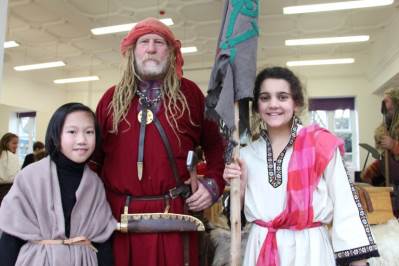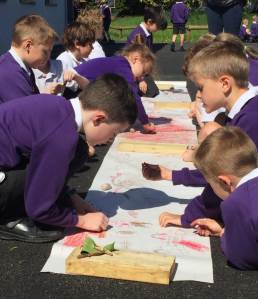History
Vision
Children use historical enquiry to understand the history of their local area - Wokingham and Reading - progressing on to the UK and finally to the wider world. Through age appropriate questioning our pupils develop understanding of one or more of the following: evidence, interpretations, cause, change, similarity and differences, and significance.
Their learning will have been deepened and embedded by real experiences offered, and they will be able to communicate their findings and present them effectively. The main themes running through all our 'Discover' curriculum areas are: experiential learning, diversity, progression of skills, communication, and STEM.
History Intent
Through our thematic curriculum, children are fully immersed in units for a term. They develop an enquiring minds that will, over time, make connections between, judgements about and perhaps gain a respect for the actions, choices and achievements of significant people from history.
We encourage our pupils to gather information, make further enquiries, analyse their findings and have the courage to ask questions about authenticity, perspective and reliability.
The coverage of recent history in the younger years – such as ‘Toys’ and ‘Transport (Boats)’ – enables children to acquire an understanding of time, events and people in their memory and their parents’ and grandparents’ memories. For key stage 1 (Year 1-2), we have designed a curriculum that can be covered chronologically in reverse to allow children to really grasp the difficult concept of the passing of time and events within and beyond living memory.
The intent in lower key stage 2 (Year 3-4) is that children can work to study ancient history which crosses time periods such as Ancient Egypt, Stone Age to Iron Age, the Maya and Roman Britain. Children start to understand how some historical events occurred concurrently in different locations.
Upper key stage 2 (Years 5 and 6) allows children to repeat and embed this sequence of chronology with a wider selection of chronological history such as their study of Victorians and Children of War.
Our commitment to learning outside the classroom can be seen through the educational visits, which help to bring the past to life. We recognise the subject’s importance in helping pupils become global citizens as they explore the differences and similarities between events, people, places, cultures and environments through time at a local, national and international level. We want to prepare them to be able to recognise the interconnectedness and interdependence of our world’s history.
Implementation
History is planned coherently as a sequence of weekly history lessons across a half term which ensures progression, skills and concepts required in the National Curriculum have full coverage. Each year group studies three or four history units across the year, and these units are the length of a half term. More information on these units can be found in our history overview below.
Each history unit has an enquiry question which forms the foundation for the knowledge we aim for children to acquire throughout the lessons. For example in Year 5’s Extreme Earth unit, their historical enquiry question is ‘What does historical evidence tell us about Pompeii?’ Children will critically investigate sources in lessons to answer this question.
Our History teaching aims to develop historical skills and concepts which are transferable to whatever period of history is being studied and will equip children for future learning. These key historical skills and concepts, which are revisited throughout different units as children move up the school, are:
1. Source analysis and interpretation
2. Historical enquiry and investigation
3. Understanding chronology
4. Communicating historically.
History Whole School Overview.
Impact
Children leave Evendons as historians, having developed their knowledge about the history units they have studied, alongside developing an understanding of historical concepts and working historically. Our curriculum is developed to ensure children frequently encounter familiar concepts (such as the concept of ‘empire’ and ‘innovation’) and build their understanding of these as they move through school.
Children experience special days, visitors and school trips that enrich and deepen their learning within history units. These include immersive dress up days with a range of hands-on, engaging activities.
Virtual reality
We use our school virtual reality headsets to bring historical learning to life, giving children opportunities to see things and places they’ve never seen before. Some examples include the exploration of Chichen Itza during the Maya unit, a Roman hypocaust when studying the Romans, and close observation of historical artefacts such as Ancient Egyptian jewellery and pottery.
Our school celebrates the children’s historical learning by displaying their work and provides opportunities for children to share what they have learnt.












